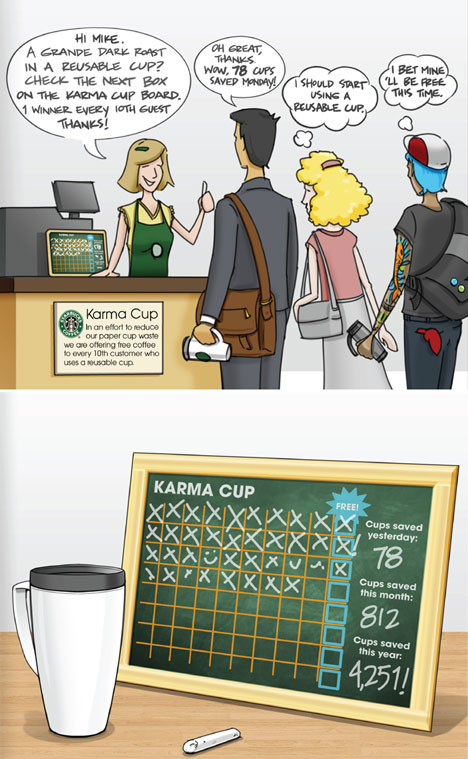Will the Karma Cup Change Behavior?
Core77 has a post on the results of the betacup competition. A $20,000 open innovation design contest to develop a way to eliminate paper coffee cup waste. According to the post we generate some 58 million cups a year which tend to end up in landfills. The goal is to design something to change our behavior from using paper coffee cups to doing something else that still gives us coffee but avoids the environmental impact. The tag line is to drink sustainably.
The winner is the Karma Cup - “A chalkboard sitting by the register. Every guest who uses a reusable mug marks the chalkboard. Every 10th guest receives a free item.”
A great example of an attempt to use ordinary materials to create extra ordinary behavior change. But will it work? From a cognitive design perspective do you expect the Karma cup to produce lasting behavior change in coffee drinkers?

June 20th, 2010 at 9:29 pm
The idea has a few things going for it. It’s simple and low-cost. It’s easy to understand. It’s highly visible. It uses behaviorism to offer a reward for desired behavior [as opposed to a punishment, which is great]. It randomizes the reward so the cause-effect is not predictable, which keeps it interesting [as in gambling]. It uses social proof or peer influence, assuming that the chalkboard does not remain empty for long periods of time, in which case it would have the opposite effect from that intended. However, I don’t think the Karma cup would produce long-lasting behavior change. I think that it might create a short-term shift in behavior until the novelty of the idea wears off, at which point people are likely to find checking the box just an annoying 2 second delay in their coffee purchase transaction and stop doing it. Some percentage might hang on to their reusable cups, but others would revert. Once the numbers seem high, the total will feel like “12 million burgers sold,” an abstraction that no longer motivates.